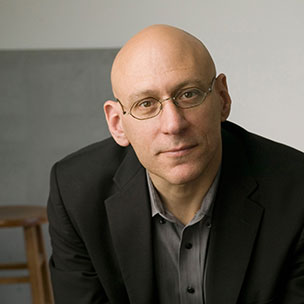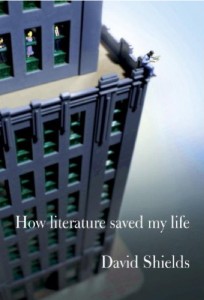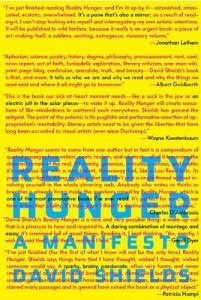Book Review: “How Literature Saved My Life” — Maybe
Notwithstanding all that David Shields writes about the books and authors he loves, both classic and contemporary, he announces that today he can’t bear to write or read novels or even short stories in their old familiar forms and structures.
How Literature Saved My Life by David Shields. Alfred A. Knopf, 224 pages, $25.95.
By David Mehegan
A writer biting and scratching at himself, like a dog with fleas, is an arresting sight. The dog is trying to relieve the discomfort, with little success. Still he can’t be at peace, and through the scratching seems to make matters worse, he must keep trying. Something of this is happening in David Shields’s aggregation of personal anecdotes and reflections about art and life that is both irritating and irresistible. It tries to do what it does not seem to believe in, have what it cannot have, and its vexation makes it try the harder. Hence the book’s energy and suspense. The very title is ironic, since it is never clear what to live is to the author or what to save life means. Toward the end, indeed, he announces that “literature has no chance whatsoever of saving my life anymore.”
The book has eight numbered chapters, each with a title and arch subtitle, such as “Negotiating Against Myself: In which I evoke my character and personality, especially the way I always argue against myself, am ridiculously ambivalent — who knew?” Each chapter is composed of a series of brief analyses or narratives with titles which sometimes repeat the chapter title, such as “Love is a long, close scrutiny” or do not, such as, “Love and theft” or “A day like any other, only shorter.” The meaning of the titles is not always clear, nor do the short pieces necessarily connect or progress in an obvious way.
On one level, the book explores a succession of books (and TV shows and movies) that Shields loves or has read and draws meanings from them for life or art. Fred Moody’s Unspeakable Joy, Otto Preminger’s Laura, Amy Hempel’s Weekend, Jonathan Lethem’s Chronic City, even the movie version of Spider-Man. There are cameo appearances by dozens of writers, including Paul Fussell, Nicholson Baker, Lorrie Moore, Herman Melville, Marcel Proust, Rick Barthelme, Edwardo Galeano, Mary Gaitskill, and David Foster Wallace.
Shields’s readings and analyses are insightful and provocative and usually relate to his own life, and to this extent do relate to the book’s theme. In addition, there are stories about people: a long-ago girlfriend whose oversexed behavior Shields recalls as wholly contrived, a dear, married friend who died of cancer at age 44, the author’s wife, daughter, aunt, and parents. From each of these encounters, Shields extracts a nugget of meaning and learning. It all makes compelling reading, as long as you don’t try to marshal a coherent point. For Shields’s argument is not premised upon coherency — the sticking-together of story or meaning or life or art — but just the opposite. It is about continuous movement in art, continuous breaking and remaking like a rack of billiard balls, starting and restarting, in order to keep ahead of the unbearable falseness and meaninglessness of life.
Shields does not stint in revealing himself (we learn that his penis size is “only standard” and when reporting the oversexed girlfriend’s comment that he has “a nice ass,” he turns to us and says, “I do! — or at least I did”). A central fact is that he finds it hard to feel, to connect in an authentic way with anyone. He often feels detached, numb. Of the poet Ben Lerner, he writes, “Both of us have/had accomplished mothers and passive fathers. Above all, both of us are in agony over the ‘incommensurability of language and experience’ and our detachment from our own emotions.” This lack of emotional connection — the predicament of modern man as understood by the art and popular psychology of the last century — is reiterated throughout. He has “trouble living anywhere other than in language. If I’m not writing it down, experience doesn’t really register.”
He quotes a line from William T. Vollmann’s Butterfly Stories: A Novel, in which it is said of the protagonist, when his wife tries to please him, “He could not feel. He could not feel!” Shields remarks, “Reading this extraordinarily intimate book about the butterfly boy’s incapacity for ordinary intimacy, I couldn’t identify more closely with him if I crawled inside his skin.” “We live in a culture,” he tells us, “that is completely mediated and artificial, rendering us (me, anyway; you, too?) exceedingly distracted, bored, and numb.” Numbness leads to the real thesis of the book: that all the old forms of literature are exhausted, life-killing clichés and that the only way to make and find meaning in and with art is to constantly shatter its forms, break it up, and start all over again. And this is the only way it can save one’s life.
Notwithstanding all that he writes about the books and authors he loves, both classic and contemporary, Shields announces that today he can’t bear to write or read novels or even short stories in their old familiar forms and structures. “By the late ‘90s, my early forties, I’d stopped writing or reading much if any fiction. I was weary unto death of teaching fiction writing.” So he expanded a graduate course packet into his 2010 book Reality Hunger: A Manifesto, a sort of collage of aesthetic ideas and quotations gathered from many sources, not always attributed. “It was the idea that all great works of literature either dissolve a genre or invent one,” he explains. “If you want to write serious books, you must be ready to break the forms.” He did not intend to cite sources, but Knopf, not so willing as he to risk suits for copyright infringement, insisted that he include a list, in tiny type, of sources at the back of the book. “If you’re over fifty, good luck reading it,” he says.
Though the book was praised by many, not everybody agreed with Shields’s insistence on the need for a total smashup of the old standards of authorship and literary ownership. “I became, briefly, the poster boy for the Death of the Novel and The End of Copyright. Fine with me. Those have become something close to my positions.” (That book and this are both, of course, copyrighted.) One can’t help but wonder if How Literature Saved My Life is meant to be some kind of answer to his critics, in that he displays his formidable learning and love of writers and writing. (One chapter is entitled “All Great Books Wind Up with the Writer Getting His Teeth Bashed In.”) Still, he comes out pretty much in the same place.

Author David Shields — he believes that traditional literary forms are exhausted husks in the age of Twitter and Facebook.
Much of his conviction that traditional literary forms are exhausted husks in the age of Twitter and Facebook grows out of a curious feature of Shields’s outlook that might be stated as, “What means nothing to me, means nothing.” “Forms are there to serve the culture,” he says, “and when they die, they die for a good reason — or so I have to believe, the novel having long since gone dark for me…” The novel bores him, so the novel is dead. He is numb and feels cut off from people, so numbness and alienation are the coin of the cultural realm. His parents posed as apotheoses of concern for social justice, but since he discovered that they were phonies, social justice is an empty idea: “The split between idealist rhetoric and ragged reality was so extreme that I’ve never quite recovered an ability to participate in the commonweal.” I’m reminded of an insight in Randolph Churchill’s biography of his famous father where the great statesman is quoted to the effect that only fools play card games. The biographer notes drily that the great man was certain that anything he was not good at was a complete waste of time.
The word “save” as in “save my life” begs at least two questions, and there is the underlying poignancy of this book. The questions are “What does it mean to save?” and “Why bother?” Some psychologist wrote that while there is a cure for a lack of sexual desire, there is no cure for a lack of desire for desire. Shields may say that he is numb, but if that is true, why should he care? If you are numb, you feel no pain. But he announces on his first page that his emotional detachment is agonizing. Indeed this book is filled with pain and longing, though softened with wit and geniality.
Shields may think that life has no intrinsic meaning, a tale told by an idiot, but that does not alter the manifest fact that he desperately wants to live. Near the end of his book, he indirectly quotes (no quotation marks, anyway) David Foster Wallace that “writing, at its best, is a bridge constructed across the abyss of human loneliness. That answer seemed to me at the time, and still seems to me, beautiful, true, and sufficient.” But like everything else in this self-biting and -scratching book, it is hard to know whether Shields really believes it. Indeed it is difficult to believe that writing of any sort, of whatever truth and beauty, whether of traditional or genre-busting shape, could bridge the gulf of his separation and emptiness: “Your art is most alive and dangerous when you use it against yourself,” he writes. “That’s why I pick at my scabs.”
David Mehegan is a contributing writer. He can be reached at dmehegan@gmail.bu.edu.
Tagged: David Shields, How Literature Saved My Life, Reality Hunger: A Manifesto, fiction


